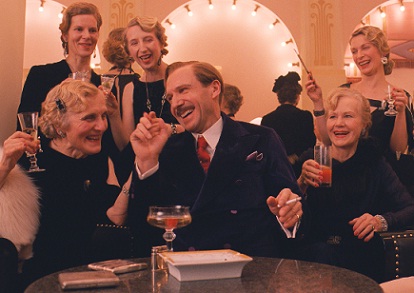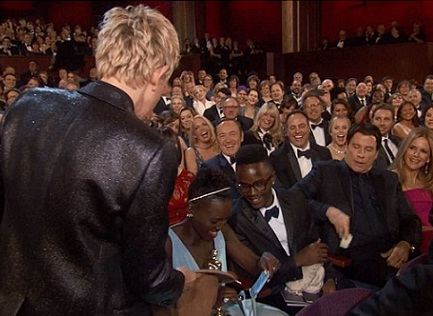The Grand Budapest Hotel

There's all the expected whimsy and preciousness and adorably fussy set design in Wes Anderson's new movie, The Grand Budapest Hotel, but there's some interesting stuff in this one that feels like a departure from his other movies. For example:
Ralph Fiennes. We all know he's a great dramatic actor with a talent for intensity and scariness, but how many comedies have we seen him in? Other than Maid in Manhattan? Clearly, he's also gifted at dry banter and wily charm, and he throws himself into the Gustave H. character with glee.
Gustave is an odd duck. He's an authoritarian taskmaster with the other hotel staff, a doting lap dog with the little old ladies, a sucker for romantic poetry, a vain peacock, and an art thief, and he can suavely stick it to the Nazi-esque barbarians without mussing his perfect manners. And he's sad and insecure, like most Wes Anderson characters.
But he swears a lot, too! Which brings us to the next notable thing:
Lots of swearing. Also nudity and sex, both of the old lady variety. Yeah. Whoa. I don't remember any on-screen sex happening in his other movies, right?
It's European. The tone of the movie was a little different, too, maybe because it's so intensely European. A few other Wes Anderson movies take place in other countries (The Life Aquatic with Steve Zissou, The Darjeeling Limited), but even those feel as American as Bill Murray's flat a's.
This movie's story about the decline of the hotel from a once-great institution serving the rich and famous to a lonely dump could be a metaphor for the Continent and its gradual loss of global influence and power. The hotel's physical transformation from an ornate pink palace to an orangey-brown Soviet-era slab of drab mirrors what happened to much of Eastern Europe over the course of the 20th century. It was shot around Dresden, in what used to be East Germany. The wistful tone of lost greatness shows up in other WA movies, but the scale of loss is bigger in scale than in The Royal Tenenbaums. This one has actual fascists, who take over the Grand Budapest Hotel and shoot people.
Heavier stuff than we usually get from Wes Anderson. But M. Gustave's streak of nose-thumbing defiance amidst all the frivolity and mountains of pastel cream pastries actually works pretty well. If this is Wes Anderson doing a political-historical thriller, I'll take it.
